8 feb 2013
Final Statement of OIC Calls for Financial Support for Palestine
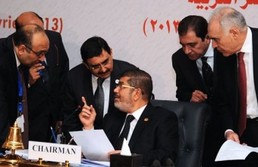
The concluding statement of the Organization of Islamic Cooperation (OIC) summit in Cairo focused on ending the violence in Syria, working toward a united and democratic Mali, and supporting the Palestinians financially.
The statement expressed support for the “quartet” of Egypt, Saudi Arabia, Turkey, and Iran, moving forward in an “earnest dialogue” between the Syrian regime and the opposition. It also backed the joint UN-Arab League envoy to Syria.
The final statement supported a united and peaceful end to the conflict in Mali, and expressed support for initiatives from the African Union, including an international military mission to Mali.
In addition, the statement reiterated the importance of the Palestinian national cause. It urged efforts to provide financial support for Palestine, through the creation of an Islamic Financial Safety Net (Amal), with further details to be discussed at an upcoming donors’ conference.
The statement expressed support for the “quartet” of Egypt, Saudi Arabia, Turkey, and Iran, moving forward in an “earnest dialogue” between the Syrian regime and the opposition. It also backed the joint UN-Arab League envoy to Syria.
The final statement supported a united and peaceful end to the conflict in Mali, and expressed support for initiatives from the African Union, including an international military mission to Mali.
In addition, the statement reiterated the importance of the Palestinian national cause. It urged efforts to provide financial support for Palestine, through the creation of an Islamic Financial Safety Net (Amal), with further details to be discussed at an upcoming donors’ conference.
3 feb 2013
Taher al-Nunu: electricity crisis is caused by occupation
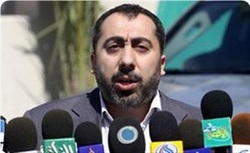
Taher Nunu, Gaza government spokesman, held the Israeli occupation fully responsible for the electricity crisis in the Gaza Strip. Nunu said in a statement on his Facebook page on Saturday evening that the government is striving in every way to find solutions to the electricity crisis.
He stressed that the power crisis is caused by the occupation due to the siege imposed on Gaza, and noted that even if it is the government's duty to find solutions and substitutes, it cannot accept exchanging the rights with electricity or money.
"We will not sell our country in exchange for electricity," said the government spokesman, denouncing some media comments which say that the government is in charge of providing electricity even through holding agreements with Israel.
Nine civilians, including 6 from the same family, died in the last few days in three separate incidents caused by the misuse of candles during power outages.
The citizen Raed Abu Hayya, 42, died on Saturday morning, after the outbreak of fire in the house of one of his neighbors in the Saftawi area in the north of Gaza City.
The spokesman for the Ministry of Health, Ashraf al-Qidra, told PIC's reporter that the citizen Abu Hayya died after inhaling smoke from the fire, while trying to help in extinguishing the fire, which was caused by a candle, and saving the house's inhabitants.
A fire had also broke out last Thursday in a house in Shejaeya neighborhood in the east of Gaza City and caused the death of a whole family.
He stressed that the power crisis is caused by the occupation due to the siege imposed on Gaza, and noted that even if it is the government's duty to find solutions and substitutes, it cannot accept exchanging the rights with electricity or money.
"We will not sell our country in exchange for electricity," said the government spokesman, denouncing some media comments which say that the government is in charge of providing electricity even through holding agreements with Israel.
Nine civilians, including 6 from the same family, died in the last few days in three separate incidents caused by the misuse of candles during power outages.
The citizen Raed Abu Hayya, 42, died on Saturday morning, after the outbreak of fire in the house of one of his neighbors in the Saftawi area in the north of Gaza City.
The spokesman for the Ministry of Health, Ashraf al-Qidra, told PIC's reporter that the citizen Abu Hayya died after inhaling smoke from the fire, while trying to help in extinguishing the fire, which was caused by a candle, and saving the house's inhabitants.
A fire had also broke out last Thursday in a house in Shejaeya neighborhood in the east of Gaza City and caused the death of a whole family.
31 jan 2013
Palestinians face growing food crisis

RAMALLAH, (IRIN) - Fluctuating prices, poverty and border restrictions mean growing numbers of Palestinians are facing food insecurity this year - one of the key priorities in the humanitarian community’s annual appeal for the Occupied Palestinian Territory (OPT).
This year’s Consolidated Appeal Process (CAP) is for US$401.6 million, a slight decrease on last year’s $416.7 million, only 68 percent of which was financed.
The UN Office for the Coordination of Humanitarian Affairs (OCHA), which helped coordinate the CAP, estimates that 1.3 million Palestinians do not have enough food.
The latest figures show the number of households without sufficient access to food has risen by 7 percent since 2011, a trend which - if continued - would have left an estimated 41 percent of Palestinians without the necessary resources to get sufficient, safe and nutritious food at the end of 2012.
“Palestinian wages have not kept pace with inflation… Many poor Palestinians have exhausted their coping mechanisms (taking on loans, cutting back consumption) and are now much more vulnerable to small price increases than they were,” said a recent World Food Programme bulletin.
According to the CAP, the situation is further worsened by restrictions on the movement of people and goods, which have resulted in higher prices of basic food commodities and reduced the purchasing power of many vulnerable families.
Restricted access
Humanitarian agencies hope to carry out 157 projects in 2013 - 58 implemented by UN agencies, 82 by international NGOs and 17 by local NGOs.
But doing this type of work is becoming increasingly difficult, according to aid workers who say getting access to vulnerable communities became tougher in 2012 because of lengthy Israeli planning procedures and restrictions on mobility and authorization.
In 2011, UN reconstruction projects had to wait an average of eight months for approval from Israel’s Coordination of Government Activities in Territories (COGAT - a unit in the Israeli Ministry of Defense that engages in coordinating civilian issues between the government of Israel, the Israel Defense Forces, international organizations, diplomats, and the Palestinian Authority). By the end of 2012, the average waiting time more than doubled to 20 months, according to the CAP report.
In addition, aid workers lost some 1,959 working hours due to 535 access incidents while attempting to pass Israeli checkpoints in 2012, Maria José Torres, OCHA deputy head of office in OPT, told IRIN.
This trend is expected to worsen once the Israeli Crossing Points Administration (CPA), a civilian department linked to the Defence Ministry, begins to operate all checkpoints.
The CPA requires regular searches of UN vehicles, unless the driver is an international staff member, and national UN staff are subject to body searches and required to walk through the crossings the CPA operates. It remains unclear, however, when exactly CPA will take over.
Impact of recent political events
The recent escalation in violence in Gaza at the end of 2012 only increased humanitarian needs and added an extra $26 million to the CAP as communities try to rebuild: this year’s appeal has a tighter focus on strictly humanitarian projects that would immediately tackle suffering, said Torres.
The indebted Palestinian government in the West Bank is also struggling to provide basic services due to a shortfall in revenue provoked by declining donor support, and also the holding back of tax revenues by Israel, which objected to the State of Palestine being given the status of a non-member observer state at the UN.
A man-made crisis?
These incidents highlight the close correlation between politics and humanitarian needs in OPT.
At the CAP presentation in Ramallah, several speakers on the podium criticized Israel for provoking what they said was a man-made humanitarian crisis in OPT.
“The UN has repeatedly called upon the State of Israel to meet its obligations as an occupying power, including halting demolitions and addressing humanitarian needs. Unfortunately, these have not been met,” said the resident humanitarian coordinator in OPT, James W. Rawley.
“The international community tries to fill the gap, and this humanitarian action is essential. But it is no substitute to political action.”
Many of the Palestinian officials and humanitarian staff present told IRIN they had become frustrated by the man-made and largely unchanged humanitarian crisis in the West Bank and the Gaza Strip.
“After 20 years of a useless peace process with Israel, the situation on the ground continues to deteriorate. The status quo is not working,” said Estephan Salameh, an adviser to the Palestinian Ministry of Planning in the West Bank.
This year’s Consolidated Appeal Process (CAP) is for US$401.6 million, a slight decrease on last year’s $416.7 million, only 68 percent of which was financed.
The UN Office for the Coordination of Humanitarian Affairs (OCHA), which helped coordinate the CAP, estimates that 1.3 million Palestinians do not have enough food.
The latest figures show the number of households without sufficient access to food has risen by 7 percent since 2011, a trend which - if continued - would have left an estimated 41 percent of Palestinians without the necessary resources to get sufficient, safe and nutritious food at the end of 2012.
“Palestinian wages have not kept pace with inflation… Many poor Palestinians have exhausted their coping mechanisms (taking on loans, cutting back consumption) and are now much more vulnerable to small price increases than they were,” said a recent World Food Programme bulletin.
According to the CAP, the situation is further worsened by restrictions on the movement of people and goods, which have resulted in higher prices of basic food commodities and reduced the purchasing power of many vulnerable families.
Restricted access
Humanitarian agencies hope to carry out 157 projects in 2013 - 58 implemented by UN agencies, 82 by international NGOs and 17 by local NGOs.
But doing this type of work is becoming increasingly difficult, according to aid workers who say getting access to vulnerable communities became tougher in 2012 because of lengthy Israeli planning procedures and restrictions on mobility and authorization.
In 2011, UN reconstruction projects had to wait an average of eight months for approval from Israel’s Coordination of Government Activities in Territories (COGAT - a unit in the Israeli Ministry of Defense that engages in coordinating civilian issues between the government of Israel, the Israel Defense Forces, international organizations, diplomats, and the Palestinian Authority). By the end of 2012, the average waiting time more than doubled to 20 months, according to the CAP report.
In addition, aid workers lost some 1,959 working hours due to 535 access incidents while attempting to pass Israeli checkpoints in 2012, Maria José Torres, OCHA deputy head of office in OPT, told IRIN.
This trend is expected to worsen once the Israeli Crossing Points Administration (CPA), a civilian department linked to the Defence Ministry, begins to operate all checkpoints.
The CPA requires regular searches of UN vehicles, unless the driver is an international staff member, and national UN staff are subject to body searches and required to walk through the crossings the CPA operates. It remains unclear, however, when exactly CPA will take over.
Impact of recent political events
The recent escalation in violence in Gaza at the end of 2012 only increased humanitarian needs and added an extra $26 million to the CAP as communities try to rebuild: this year’s appeal has a tighter focus on strictly humanitarian projects that would immediately tackle suffering, said Torres.
The indebted Palestinian government in the West Bank is also struggling to provide basic services due to a shortfall in revenue provoked by declining donor support, and also the holding back of tax revenues by Israel, which objected to the State of Palestine being given the status of a non-member observer state at the UN.
A man-made crisis?
These incidents highlight the close correlation between politics and humanitarian needs in OPT.
At the CAP presentation in Ramallah, several speakers on the podium criticized Israel for provoking what they said was a man-made humanitarian crisis in OPT.
“The UN has repeatedly called upon the State of Israel to meet its obligations as an occupying power, including halting demolitions and addressing humanitarian needs. Unfortunately, these have not been met,” said the resident humanitarian coordinator in OPT, James W. Rawley.
“The international community tries to fill the gap, and this humanitarian action is essential. But it is no substitute to political action.”
Many of the Palestinian officials and humanitarian staff present told IRIN they had become frustrated by the man-made and largely unchanged humanitarian crisis in the West Bank and the Gaza Strip.
“After 20 years of a useless peace process with Israel, the situation on the ground continues to deteriorate. The status quo is not working,” said Estephan Salameh, an adviser to the Palestinian Ministry of Planning in the West Bank.
30 jan 2013
Despite financial crisis, 13,000 dollars for Fayyad’s government spokeswoman
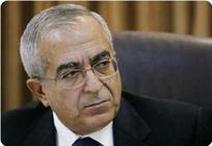
The Palestinian government in Ramallah has paid an advance payment for Fayyad’s government spokeswoman estimated at more than 13 thousand dollars, despite its financial crisis, the head of the public sector workers union in the West Bank, Bassam Zakarneh, revealed. Zakarneh called on Tuesday for opening an official investigation regarding the advance payment that came at a time when the government cannot pay the salaries of state employees.
The spokeswoman for Fayyad's government, Nour Awda, has received an advance payment, estimated at $13,350, in two installments, the first was on November 28, and the second was paid a week ago, according to the member of the Fatah Movement revolutionary council.
Zakarneh denounced Awda's calls "for more steadfastness to cope with the economic crisis," urging Fayyad's government not to differentiate between employees and officials.
For its part, the government spokeswoman refused to comment on the statements made by the union chief Bassam Zakarneh.
The spokeswoman for Fayyad's government, Nour Awda, has received an advance payment, estimated at $13,350, in two installments, the first was on November 28, and the second was paid a week ago, according to the member of the Fatah Movement revolutionary council.
Zakarneh denounced Awda's calls "for more steadfastness to cope with the economic crisis," urging Fayyad's government not to differentiate between employees and officials.
For its part, the government spokeswoman refused to comment on the statements made by the union chief Bassam Zakarneh.
Israel to give $100 million in withheld Palestinian funds
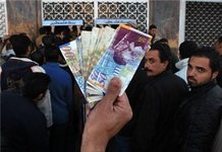
By Dan Williams
Israel will give President Mahmoud Abbas's administration around $100 million in tax revenues that had been withheld in retaliation for his statehood bid in the United Nations, Israeli officials said on Wednesday.
They described the handover as a one-time deal, signalling rightist Israeli Prime Minister Benjamin Netanyahu had not formally scrapped sanctions that have hurt the Palestinian Authority in the occupied West Bank and worried world powers.
But the decision follows surprise setbacks for Netanyahu in a national election this month that, while giving him enough of a lead to head the next Israeli government, also set the stage for more moderate statecraft by boosting centrist challengers whom he must now consider as coalition partners.
Under interim peace deals, Israel collects some $100 million a month in duties on behalf of the Palestinian Authority, money Abbas badly needs to pay public sector salaries. It began withholding the funds as punishment for the UN's acceptance of Palestine as a non-member state in November.
Israel said the December levies would be used instead to start paying off $200 million the Palestinians owe the Israel Electric Corporation, and predicted at the time that the lien on PA funds would be in force until March at least.
The PA's economic troubles were raised this week in a meeting between Netanyahu and Tony Blair, peace envoy for the United States, United Nations, European Union and Russia, an Israeli official said.
Following those talks, the official told Reuters on condition of anonymity, "we have agreed to transfer one month's payment, because of the difficult financial situation there.
"This is a one-time decision and there is no decision yet on what will happen next."
Another Israeli official said the handover would take place imminently, "perhaps even today".
Israel has previously frozen payments to the PA during times of heightened security and diplomatic tensions, provoking strong international criticism, such as when the UN cultural body UNESCO granted the Palestinians full membership in 2011.
Abbas's UN victory was a diplomatic setback for the United States and Israel, which were joined by only seven other countries in voting against upgrading the Palestinians' observer status to "non-member state", like the Vatican, from "entity".
Hours after the UN vote, Israel said it would authorize 3,000 new settler homes in the West Bank and East Jerusalem and expedite planning work for thousands more in a geographically sensitive area close to Jerusalem. Critics say this plan would kill off Palestinian hopes of a viable state.
Netanyahu's current religious-nationalist government looks likely to be replaced with a coalition more accommodating of the Palestinians.
The runners-up in the Jan. 22 ballot, the centrist Yesh Atid and left-leaning Labor parties, both demand Israel try to revive peacemaking stalled for more than two years.
Israel will give President Mahmoud Abbas's administration around $100 million in tax revenues that had been withheld in retaliation for his statehood bid in the United Nations, Israeli officials said on Wednesday.
They described the handover as a one-time deal, signalling rightist Israeli Prime Minister Benjamin Netanyahu had not formally scrapped sanctions that have hurt the Palestinian Authority in the occupied West Bank and worried world powers.
But the decision follows surprise setbacks for Netanyahu in a national election this month that, while giving him enough of a lead to head the next Israeli government, also set the stage for more moderate statecraft by boosting centrist challengers whom he must now consider as coalition partners.
Under interim peace deals, Israel collects some $100 million a month in duties on behalf of the Palestinian Authority, money Abbas badly needs to pay public sector salaries. It began withholding the funds as punishment for the UN's acceptance of Palestine as a non-member state in November.
Israel said the December levies would be used instead to start paying off $200 million the Palestinians owe the Israel Electric Corporation, and predicted at the time that the lien on PA funds would be in force until March at least.
The PA's economic troubles were raised this week in a meeting between Netanyahu and Tony Blair, peace envoy for the United States, United Nations, European Union and Russia, an Israeli official said.
Following those talks, the official told Reuters on condition of anonymity, "we have agreed to transfer one month's payment, because of the difficult financial situation there.
"This is a one-time decision and there is no decision yet on what will happen next."
Another Israeli official said the handover would take place imminently, "perhaps even today".
Israel has previously frozen payments to the PA during times of heightened security and diplomatic tensions, provoking strong international criticism, such as when the UN cultural body UNESCO granted the Palestinians full membership in 2011.
Abbas's UN victory was a diplomatic setback for the United States and Israel, which were joined by only seven other countries in voting against upgrading the Palestinians' observer status to "non-member state", like the Vatican, from "entity".
Hours after the UN vote, Israel said it would authorize 3,000 new settler homes in the West Bank and East Jerusalem and expedite planning work for thousands more in a geographically sensitive area close to Jerusalem. Critics say this plan would kill off Palestinian hopes of a viable state.
Netanyahu's current religious-nationalist government looks likely to be replaced with a coalition more accommodating of the Palestinians.
The runners-up in the Jan. 22 ballot, the centrist Yesh Atid and left-leaning Labor parties, both demand Israel try to revive peacemaking stalled for more than two years.
29 jan 2013
Report: Israel to transfer Palestinian tax revenue

Israeli authorities will transfer Palestinian tax revenues after refusing for two months to distribute the funds, Israeli media reported late Tuesday.
The transfer, reported by Israel's Haaretz newspaper, comes after government employees announced a strike over the Palestinian Authority's failure to pay salaries.
The transfer, reported by Israel's Haaretz newspaper, comes after government employees announced a strike over the Palestinian Authority's failure to pay salaries.
PA finance minister meets Quartet envoy Blair
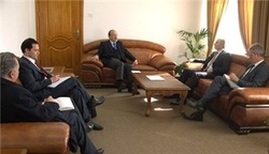
Palestinian Authority Finance Minister Nabil Qassis met with Middle East Quartet envoy Tony Blair in Ramallah on Monday.
Qassis called on the Quartet to intervene in the PA's political crisis and pressure Israel to release Palestinian tax revenues withheld since last November as punishment for the UN's acceptance of Palestine as a non-member state.
The minister stressed that financial support must be provided to the PA to help meet its obligations.
The Ramallah-based government has been hard-pressed to pay more than $300 million in monthly expenditures since Israel announced it would confiscate $100 million dollars it collects in customs taxes on their behalf each month.
Full salaries for public sector workers have not been paid in almost three months and government initiatives to increase revenue by collecting years worth of electricity and water bills from the public have been hampered by street protests.
Qassis called on the Quartet to intervene in the PA's political crisis and pressure Israel to release Palestinian tax revenues withheld since last November as punishment for the UN's acceptance of Palestine as a non-member state.
The minister stressed that financial support must be provided to the PA to help meet its obligations.
The Ramallah-based government has been hard-pressed to pay more than $300 million in monthly expenditures since Israel announced it would confiscate $100 million dollars it collects in customs taxes on their behalf each month.
Full salaries for public sector workers have not been paid in almost three months and government initiatives to increase revenue by collecting years worth of electricity and water bills from the public have been hampered by street protests.
26 jan 2013
Teachers to launch strike action this week, union says
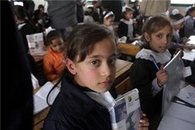
Teachers in the West Bank will go on strike for three days this week, the teachers union announced Saturday.
Ahmed Anis, secretary general of the teachers union, told Ma'an that there will be no classes in West Bank schools on Sunday, Monday and Tuesday, as teachers protest against irregular salary payments by the Palestinian Authority.
Anis called on the PA to respond to teachers' demands before Feb. 5, which was the deadline set by the union to reach an agreement over salaries.
If no agreement is made before the due date, the union will escalate strike action to unprecedented levels, he said, adding that classes will be resumed on Wednesday until Feb. 5.
Ahmed Anis, secretary general of the teachers union, told Ma'an that there will be no classes in West Bank schools on Sunday, Monday and Tuesday, as teachers protest against irregular salary payments by the Palestinian Authority.
Anis called on the PA to respond to teachers' demands before Feb. 5, which was the deadline set by the union to reach an agreement over salaries.
If no agreement is made before the due date, the union will escalate strike action to unprecedented levels, he said, adding that classes will be resumed on Wednesday until Feb. 5.
PA minister expects Israel to resume tax transfers

The Palestinian Authority minister of economy said Friday that he expects the Israeli government to stop withholding tax revenues in the near future.
Jawad al-Naji told Ma’an that the financial crisis would be solved if the Israeli government pays the tax revenues, if Arab countries contribute to the so-called safety net, and when European countries resume aid.
Al-Naji said aid from the EU was expected to resume next month, while the Israeli government will likely begin transferring tax revenues, which he said was an obligation under international law.
The minister also said Arab countries were expected to contribute to the PA "safety net" to help it continue operating despite sanctions. Saudi Arabia is contributing the most, but he said Iraq, Kuwait and Qatar were likely to contribute to the initiative.
He highlighted that officials were waiting until a summit in March to confirm the proposed safety net.
Jawad al-Naji told Ma’an that the financial crisis would be solved if the Israeli government pays the tax revenues, if Arab countries contribute to the so-called safety net, and when European countries resume aid.
Al-Naji said aid from the EU was expected to resume next month, while the Israeli government will likely begin transferring tax revenues, which he said was an obligation under international law.
The minister also said Arab countries were expected to contribute to the PA "safety net" to help it continue operating despite sanctions. Saudi Arabia is contributing the most, but he said Iraq, Kuwait and Qatar were likely to contribute to the initiative.
He highlighted that officials were waiting until a summit in March to confirm the proposed safety net.
24 jan 2013
EU Supports Farmers, Herders with over €11 Million
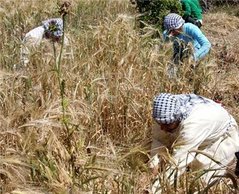
The European Union (EU) announced Thursday an €11.45 million financial support for the Palestinian agricultural sector, according to a press statement. It said that the EU is partnering with four organizations in the field of agriculture - Agricultural Development Association (PARC), the Food and Agriculture Organization of the UN (FAO), Oxfam Italy and the Union of Agricultural Work Committees (UAWC) - to continue its work in the fields of olive production and livestock.
The four projects, which started in 2013, are fully in line with the “Agriculture Sector Strategy: A Shared Vision” developed by the Palestinian Authority Ministry of Agriculture with the support of the donor community.
They will take place in the West Bank as well as the Gaza Strip with particular focus on some of the most vulnerable communities, said the release.
In partnership with UAWC, the EU will work with small-scale farmers producing olive and olive-oil in Tulkarm, Salfit and Qalqiliya to develop an efficient management for their businesses.
Building on successful work from previous years, the focus is on producing high quality olive oil at reduced cost and increasing access to local and foreign markets.
The project will enhance the participation of women farmers by developing their know-how in niche areas of production (e.g.: production of olive soap and olive cosmetics).
In addition, in partnership with PARC, the EU will develop pilot farms for producing high quality olives in larger quantities in accordance with international standards. More than 10,000 Palestinian farmers will also benefit from comprehensive guidelines to improve grove productivity and olive oil quality.
“Palestinian agriculture, and olive oil production in particular, is one the most significant components of the Palestinian economy,” said the EU representative, John Gatt-Rutter. “Olive oil production is not just a source of income for Palestinian families but has traditionally become the means towards social development. Families in villages across the West Bank and Gaza were able to raise and educate their children from this income,” he added.
Gatt-Rutter said that this program also supports the most vulnerable herders' communities, especially Bedouins in the West Bank, who have limited access to natural resources such as water and land.
Households that base their livelihoods on livestock production are among the most food insecure in the West Bank and Gaza Strip, said the press statement.
In an effort to go beyond emergency interventions and achieve a long-term, sustainable improvement of herders' livelihoods, FAO – with the support of the EU – will work with the Ministry of Agriculture to improve the delivery of services to herders associations' and effectively support a market-oriented development.
Bedouin communities active in so-called “pastoral” farming will be specifically targeted, through the EU's work with Oxfam Italy, by ensuring that these marginalized communities are better represented in the decision-making process, explained the EU statement.
The four projects, which started in 2013, are fully in line with the “Agriculture Sector Strategy: A Shared Vision” developed by the Palestinian Authority Ministry of Agriculture with the support of the donor community.
They will take place in the West Bank as well as the Gaza Strip with particular focus on some of the most vulnerable communities, said the release.
In partnership with UAWC, the EU will work with small-scale farmers producing olive and olive-oil in Tulkarm, Salfit and Qalqiliya to develop an efficient management for their businesses.
Building on successful work from previous years, the focus is on producing high quality olive oil at reduced cost and increasing access to local and foreign markets.
The project will enhance the participation of women farmers by developing their know-how in niche areas of production (e.g.: production of olive soap and olive cosmetics).
In addition, in partnership with PARC, the EU will develop pilot farms for producing high quality olives in larger quantities in accordance with international standards. More than 10,000 Palestinian farmers will also benefit from comprehensive guidelines to improve grove productivity and olive oil quality.
“Palestinian agriculture, and olive oil production in particular, is one the most significant components of the Palestinian economy,” said the EU representative, John Gatt-Rutter. “Olive oil production is not just a source of income for Palestinian families but has traditionally become the means towards social development. Families in villages across the West Bank and Gaza were able to raise and educate their children from this income,” he added.
Gatt-Rutter said that this program also supports the most vulnerable herders' communities, especially Bedouins in the West Bank, who have limited access to natural resources such as water and land.
Households that base their livelihoods on livestock production are among the most food insecure in the West Bank and Gaza Strip, said the press statement.
In an effort to go beyond emergency interventions and achieve a long-term, sustainable improvement of herders' livelihoods, FAO – with the support of the EU – will work with the Ministry of Agriculture to improve the delivery of services to herders associations' and effectively support a market-oriented development.
Bedouin communities active in so-called “pastoral” farming will be specifically targeted, through the EU's work with Oxfam Italy, by ensuring that these marginalized communities are better represented in the decision-making process, explained the EU statement.
23 jan 2013
Exports Up in November, says Statistics Bureau

Exports increased in November by 12.5% compared to October and increased by 15.9% compared to November 2011 and reached $69.4 million, said the Palestinian Central Bureau of Statistics on Wednesday. Imports decreased in November by 11.1% compared to October and decreased by 4.5% compared to November 2011 and reached $315.2 million, it added.
The trade balance showed a decrease in trade deficit by 16.1% compared to October. However, it increased by 9% compared to November 2011 and reached $245.8 million.
The trade balance showed a decrease in trade deficit by 16.1% compared to October. However, it increased by 9% compared to November 2011 and reached $245.8 million.
21 jan 2013
Denmark, Holland Contribute Over €7M to Palestinians
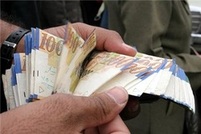
Denmark and Holland jointly contributed approximately €7.2 million to the payment of the December salaries and pensions of more than 80,000 Palestinian civil servants and pensioners in the West Bank and the Gaza Strip, said a press statement by the European Union office in Jerusalem. It said the European Union (EU) made the contribution to the Palestinian Authority (PA) on Sunday, which was channeled through the PEGASE mechanism.
Denmark’s contribution amounted to approximately €6 million and Holland’s contribution was around €1.2 million earmarked specifically to the PA’s salaries in the justice sector.
The contribution to the recurring expenditure of the PA was part of the EU’s 2012 commitment, said the EU representative in Jerusalem, John Gatt-Rutter.
“The severe financial crisis the Palestinian Authority is facing has dire consequences for the Palestinian people whose salaries are delayed and services disrupted,” he said in the statement.
Gatt-Rutter criticized Israeli withholding of over $200 million in tax revenues it has collected over the last two months on behalf of the Palestinian Authority on Palestinian-imported goods that go through its ports.
The PA relies heavily on these funds to pay over $170 million in monthly salaries to its around 180,000 civil and security personnel.
“I hence want to stress the crucial importance of the full, timely, predictable and transparent transfer of tax and custom revenues to the PA by Israel,” he said, adding that “I would also like to renew our call on other donors to deliver on their pledges and step up their financial efforts to preserve the PA's ability to deliver services to the Palestinian people.
Modest Arab and European aid helped the PA pay on Sunday only half of the December salary to its employees while it has not yet been able to pay the second half of the November salary.
Denmark’s contribution amounted to approximately €6 million and Holland’s contribution was around €1.2 million earmarked specifically to the PA’s salaries in the justice sector.
The contribution to the recurring expenditure of the PA was part of the EU’s 2012 commitment, said the EU representative in Jerusalem, John Gatt-Rutter.
“The severe financial crisis the Palestinian Authority is facing has dire consequences for the Palestinian people whose salaries are delayed and services disrupted,” he said in the statement.
Gatt-Rutter criticized Israeli withholding of over $200 million in tax revenues it has collected over the last two months on behalf of the Palestinian Authority on Palestinian-imported goods that go through its ports.
The PA relies heavily on these funds to pay over $170 million in monthly salaries to its around 180,000 civil and security personnel.
“I hence want to stress the crucial importance of the full, timely, predictable and transparent transfer of tax and custom revenues to the PA by Israel,” he said, adding that “I would also like to renew our call on other donors to deliver on their pledges and step up their financial efforts to preserve the PA's ability to deliver services to the Palestinian people.
Modest Arab and European aid helped the PA pay on Sunday only half of the December salary to its employees while it has not yet been able to pay the second half of the November salary.
Prices up in 2012, says Statistics Bureau
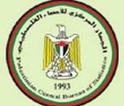
The overall Wholesale Price Index (WPI) for the Palestinian Territory increased by 0.93% in 2012 compared to 2011, the Palestinian Central Bureau of Statistics (PCBS) said Monday. The index increase was due to the increase of manufacturing group by 2.02%.
The price index of imported products increased by 2.19% while it decreased for local products by 1.08%, said the PCBS.
WPI for the fourth quarter 2012 decreased by 0.77% compared to the third quarter.
Price index for imported products in fourth quarter increased by 0.35% compared to the third quarter and it decreased for local products by 3.01% compared to the third quarter.
The changes of WPI in the fourth quarter was due to a decrease in price index of agricultural goods by 1.42%, fishing by 0.6%, manufacturing group by 0.51% and mining and quarrying by 0.07%.
The price index of imported products increased by 2.19% while it decreased for local products by 1.08%, said the PCBS.
WPI for the fourth quarter 2012 decreased by 0.77% compared to the third quarter.
Price index for imported products in fourth quarter increased by 0.35% compared to the third quarter and it decreased for local products by 3.01% compared to the third quarter.
The changes of WPI in the fourth quarter was due to a decrease in price index of agricultural goods by 1.42%, fishing by 0.6%, manufacturing group by 0.51% and mining and quarrying by 0.07%.
14 jan 2013
Consumer Price Index Decreases in December 2012, says Statistics Bureau
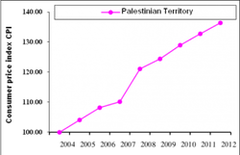
The overall Consumer Price Index (CPI) for the Palestinian Territory during December 2012 decreased by 0.01% compared to November 2012, according to Palestinian Central Bureau of Statistics (PCBS) press release on Tuesday. It said that the CPI, during December 2012, increased by 1.72% compared to December 2011; 2.71% in the West Bank, 3.15% in Jerusalem, and 0.55% in Gaza Strip.
The change in CPI for October 2012 is traced back to changes in prices of the expenditure sub groups compared to the previous month, such as fresh vegetables which decreased by 6.24%, fresh fruits by 1.40% and fuel for transportation by 0.55%.
The change in CPI for October 2012 is traced back to changes in prices of the expenditure sub groups compared to the previous month, such as fresh vegetables which decreased by 6.24%, fresh fruits by 1.40% and fuel for transportation by 0.55%.
Dr. Fayyad Urges Arab Countries to Provide Aid to PA
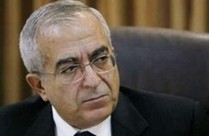
by Haaretz
Palestinian Prime Minister Salam Fayyad warned Sunday that his government could fail to meet its obligations to its people because of a cash crunch, and urged Arab countries to deliver on promised aid.
Fayyad met with Arab League members to discuss ways to raise the $100 million they pledged earlier to his Palestinian Authority. Arab League chief Nabil Elaraby said seven countries have responded favorably, but he did not name them.
League foreign ministers meeting in Cairo decided to dispatch a delegation to the region to raise the funds the Palestinian government needs to make ends meet. The group would include the Elaraby, Fayyad, and the foreign ministers of Iraq and Lebanon.
Fayyad told The Associated Press last week that the authority's cash crunch has gradually worsened in recent years, reaching a point where the government is unable to pay the salaries of about 150,000 government employees. On Sunday, he told reporters that the situation may push more than 1.5 million of 4 million Palestinians into poverty.
He warned that the financial crisis could lead to the disintegration of the Palestinian Authority.
"The absence of these funds threatens the Palestinian Authority's ability to carry out its obligations to the Palestinian people, including helping them stay in the territory," he said.
Fayyad said the Palestinian's successful bid in November to gain U.N. recognition for a state of Palestine has so far led only to Israeli punitive measures, including a halt to monthly transfers of about $100 million in tax funds the Jewish state collects on behalf of the Palestinians.
In a statement, the Arab League urged Israel to release those funds, and called on the international community to press Israel to do so.
Fayyad said those tax rebates amount to about one-third of the monthly operating costs of the Palestinian Authority. Fayyad said he now only takes in about $50 million a month in revenues.
Israel has said it used the withheld money to settle Palestinian Authority debt to Israeli companies, and it's not clear whether the transfers will resume.
The Palestinian Authority employs some 150,000 people, including civil servants and members of the security forces. About 60,000 live in Gaza and served under Palestinian leader Mahmoud Abbas before the Islamic militant Hamas group took over the strip in 2007, but continue to draw salaries even though they've since been replaced by Hamas loyalists.
In recent months, the government has paid salaries in installments. The Palestinian Authority relies heavily on foreign aid, and is already heavily indebted to local banks and private businesses.
Palestinian Prime Minister Salam Fayyad warned Sunday that his government could fail to meet its obligations to its people because of a cash crunch, and urged Arab countries to deliver on promised aid.
Fayyad met with Arab League members to discuss ways to raise the $100 million they pledged earlier to his Palestinian Authority. Arab League chief Nabil Elaraby said seven countries have responded favorably, but he did not name them.
League foreign ministers meeting in Cairo decided to dispatch a delegation to the region to raise the funds the Palestinian government needs to make ends meet. The group would include the Elaraby, Fayyad, and the foreign ministers of Iraq and Lebanon.
Fayyad told The Associated Press last week that the authority's cash crunch has gradually worsened in recent years, reaching a point where the government is unable to pay the salaries of about 150,000 government employees. On Sunday, he told reporters that the situation may push more than 1.5 million of 4 million Palestinians into poverty.
He warned that the financial crisis could lead to the disintegration of the Palestinian Authority.
"The absence of these funds threatens the Palestinian Authority's ability to carry out its obligations to the Palestinian people, including helping them stay in the territory," he said.
Fayyad said the Palestinian's successful bid in November to gain U.N. recognition for a state of Palestine has so far led only to Israeli punitive measures, including a halt to monthly transfers of about $100 million in tax funds the Jewish state collects on behalf of the Palestinians.
In a statement, the Arab League urged Israel to release those funds, and called on the international community to press Israel to do so.
Fayyad said those tax rebates amount to about one-third of the monthly operating costs of the Palestinian Authority. Fayyad said he now only takes in about $50 million a month in revenues.
Israel has said it used the withheld money to settle Palestinian Authority debt to Israeli companies, and it's not clear whether the transfers will resume.
The Palestinian Authority employs some 150,000 people, including civil servants and members of the security forces. About 60,000 live in Gaza and served under Palestinian leader Mahmoud Abbas before the Islamic militant Hamas group took over the strip in 2007, but continue to draw salaries even though they've since been replaced by Hamas loyalists.
In recent months, the government has paid salaries in installments. The Palestinian Authority relies heavily on foreign aid, and is already heavily indebted to local banks and private businesses.
13 jan 2013
Energy authority: Qatari fuel shipments to Gaza resumed
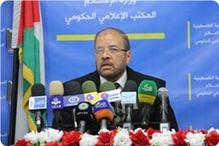
Deputy chairman of the Gaza energy authority Fathi Khalil has said that Qatari fuel supplies to Gaza Strip via Egypt had resumed after one month stoppage. He told a TV program that power would improve in the besieged enclave after arrival of the Qatari fuel.
He said that joining an Arab electricity network would solve the electricity problem in Gaza, noting that the decision is political and needs a lot of routine work to accomplish.
Khalil said that a plan to rehabilitate the Gaza grid was underway in order to match the power of the Arab network.
He said that joining an Arab electricity network would solve the electricity problem in Gaza, noting that the decision is political and needs a lot of routine work to accomplish.
Khalil said that a plan to rehabilitate the Gaza grid was underway in order to match the power of the Arab network.
11 jan 2013
Transportation Strike Paralyzes West Bank

On Wednesday 9Th January, drivers of public transportation sector in the West Bank went on a one-day strike to protest government failure to meet their demands paralyzing as a result life across the West Bank, Palestinian official news agency WAFA reported.
The drivers are demanding reduction in fuel prices in light of the current bad economic situation.
They said they will escalate their strike if the government does not respond to their demands.
Around 25,000 drivers went on strike in September protesting the high prices of fuel.
Meanwhile, head of the public transportation union stressed that the union did not call for this strike and that it was conducted by the drivers themselves.
The drivers are demanding reduction in fuel prices in light of the current bad economic situation.
They said they will escalate their strike if the government does not respond to their demands.
Around 25,000 drivers went on strike in September protesting the high prices of fuel.
Meanwhile, head of the public transportation union stressed that the union did not call for this strike and that it was conducted by the drivers themselves.
Arab League To Convene Next Week To Discuss P.A. Financial Crises

The Arab League announced Sunday that it will be holding a session for Arab Foreign Ministers in Cairo, next Sunday, in order to discuss the Palestinian financial crisis, and the situation of Palestinian refugees in Syria and Lebanon.
The decision was made after Lebanon officially requested the Arab League to convene to discuss these urgent issues.
Arab League deputy Secretary-General, Ahmad Ben Hilli, stated that the Arab Foreign Ministers will also be discussing ways to aid the refugees who fled from Syria to Lebanon, and other nearby countries.
Bin Hilly added that the current sharp financial crisis the P.A is facing, and the political developments after the P.A. managed to obtain nonmember state status at the UN General Assembly, will be discussed during the upcoming session.
He further stated that the Arab League Secretary General, Nabil Al-Arabi, will be heading to Europe in order to hold talks on the ways to deal with the current situation in the Middle East, and the means to deal with the situation in Syria.
Bin Hilly added that Al-Arabi will inform the Arab Foreign Ministers on the developments in the financial crisis the P.A. is facing and will ask them to clarify their countries' stances regarding implementing what they vowed, during the Arab Summit in Baghdad, regarding providing a financial safety net of a $150 Million a month, to support the state of Palestine.
The decision was made after Lebanon officially requested the Arab League to convene to discuss these urgent issues.
Arab League deputy Secretary-General, Ahmad Ben Hilli, stated that the Arab Foreign Ministers will also be discussing ways to aid the refugees who fled from Syria to Lebanon, and other nearby countries.
Bin Hilly added that the current sharp financial crisis the P.A is facing, and the political developments after the P.A. managed to obtain nonmember state status at the UN General Assembly, will be discussed during the upcoming session.
He further stated that the Arab League Secretary General, Nabil Al-Arabi, will be heading to Europe in order to hold talks on the ways to deal with the current situation in the Middle East, and the means to deal with the situation in Syria.
Bin Hilly added that Al-Arabi will inform the Arab Foreign Ministers on the developments in the financial crisis the P.A. is facing and will ask them to clarify their countries' stances regarding implementing what they vowed, during the Arab Summit in Baghdad, regarding providing a financial safety net of a $150 Million a month, to support the state of Palestine.
5 jan 2013
PA Cancels Electricity Debts in West Bank
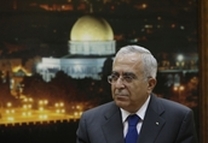
The Palestinian Prime Minister Salam Fayyad announced the Palestinian Authority will cancel outstanding electricity debts for every West Bank resident who is unable to pay the electricity bills owed until Dec. 31, 2012.
Earlier on Sunday, Salam Fayyad, signed a deal with popular committees in West Bank refugee camps ending refugees' exemption from electricity costs, but also canceling all their outstanding debts.
Refugees in the West Bank's different cities gathered on Tuesday to protest against the new law, leading to violent clashes with Palestinian security forces.
Earlier on Sunday, Salam Fayyad, signed a deal with popular committees in West Bank refugee camps ending refugees' exemption from electricity costs, but also canceling all their outstanding debts.
Refugees in the West Bank's different cities gathered on Tuesday to protest against the new law, leading to violent clashes with Palestinian security forces.
4 jan 2013
March in Bethlehem to protest at the policies of Fayyad government
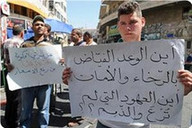
BETHLEHEM, (PIC)-- A mass rally was launched on Thursday evening from Aida refugee camp in Bethlehem to condemn policies of West Bank's Prime Minister Salam Fayyad, and in rejection of price hikes and deteriorating living conditions.
Hundreds of people have participated in the march which was launched from Aida camp down to Azza refugee camp.
They roamed a number of the city's streets, and chanted slogans rejecting forcing the camps' residents to pay electricity charges, and condemning corruption and the policies adopted by Salam Fayyad's government.
The citizens demanded PA leadership and Fayyad's government to take practical steps and adopt a national policy to be able to overcome the economic crisis.
Hundreds of people have participated in the march which was launched from Aida camp down to Azza refugee camp.
They roamed a number of the city's streets, and chanted slogans rejecting forcing the camps' residents to pay electricity charges, and condemning corruption and the policies adopted by Salam Fayyad's government.
The citizens demanded PA leadership and Fayyad's government to take practical steps and adopt a national policy to be able to overcome the economic crisis.
3 jan 2013
PCBS: The Industrial Production Index, During November 2012
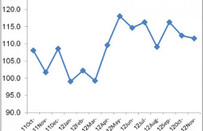
Index of Quantity of Industrial Production in the Palestinian Territory, November 2012
The overall Quantity of Industrial Production Index (IPI) in the Palestinian Territory reached 111.57 in November 2012 (base month January 2011=100) with a decrease of 0.76% compared to the previous month (October 2012).
Quantity of Industrial Production Index for November 2012 decreased due to the decrease in the manufacturing industry by 1.26% compared to the previous month, which has a share of 80.56% from the total industry. While mining and quarrying industry increased by 3.06% during November 2012 compared to the previous month which forms a share of 4.59% of the total industry, and water supply and electricity industry increased by 0.51% compared to the previous month which has a share of 14.85% of the total industry.
Note: Relative share for the main industrial activities represents the percentage distribution of value added (VA) for the industrial institutions in 2009.
Industrial Production Drops in November, says Statistical Bureau
The overall industrial production index (IPI) in the Palestinian Territory decrease in November by 0.76% compared to the previous month, a press release by the Palestinian Central Bureau of Statistics (PCBS) said Thursday. It said IPI decreased due to the decrease in the manufacturing industry by 1.26%, which has a share of 80.56% from the total industry.
Mining and quarrying industry increased in November compared to October by 3.06%, forming a share of 4.59% of the total industry, while the water supply and electricity industry, which has a share of 14.85% of the total industry, increased by 0.51% during the same period, added PCBS.
The overall Quantity of Industrial Production Index (IPI) in the Palestinian Territory reached 111.57 in November 2012 (base month January 2011=100) with a decrease of 0.76% compared to the previous month (October 2012).
Quantity of Industrial Production Index for November 2012 decreased due to the decrease in the manufacturing industry by 1.26% compared to the previous month, which has a share of 80.56% from the total industry. While mining and quarrying industry increased by 3.06% during November 2012 compared to the previous month which forms a share of 4.59% of the total industry, and water supply and electricity industry increased by 0.51% compared to the previous month which has a share of 14.85% of the total industry.
Note: Relative share for the main industrial activities represents the percentage distribution of value added (VA) for the industrial institutions in 2009.
Industrial Production Drops in November, says Statistical Bureau
The overall industrial production index (IPI) in the Palestinian Territory decrease in November by 0.76% compared to the previous month, a press release by the Palestinian Central Bureau of Statistics (PCBS) said Thursday. It said IPI decreased due to the decrease in the manufacturing industry by 1.26%, which has a share of 80.56% from the total industry.
Mining and quarrying industry increased in November compared to October by 3.06%, forming a share of 4.59% of the total industry, while the water supply and electricity industry, which has a share of 14.85% of the total industry, increased by 0.51% during the same period, added PCBS.
2 jan 2013
Cabinet Confirms Efforts to Confront Financial Crisis
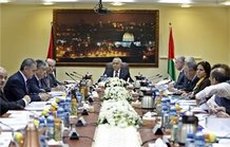
The Palestinian cabinet Wednesday confirmed that the government is exerting maximum effort to confront the financial crisis which reached its peak due to the Israeli piracy of Palestinian funds, according to a statement issued following the weekly cabinet meeting. The Cabinet also renewed its call on the Arab brethren to assume their responsibilities towards confronting the consequences of the Israeli aggression against our people's livelihoods.
It called on Arab states to activate the Arab safety net and disperse the funds it had pledged, affirming that the National Authority needs 240 million dollars a month to be able to fulfill its obligations, as long as Israel continues to withhold our funds.
In the same context, the Cabinet called on the international community to assume its responsibility without any hesitation or equivocation, to compel Israel to the rules of international law and relevant international resolutions , and to stop the robbery of our people's resources and income, as well as to stop undermining the National Authority’s standing to undermine our people's ability to stay steadfast and materializing the independent Palestinian state, with Jerusalem as its capital on the borders of 1967.
Furthermore, the Cabinet expressed its wish that the New Year would be the year of freedom, independence and redemption of the occupation, and reaffirmed the National Authority's determination to continue and accelerate the pace towards the realization of national sovereignty on the land of the independent state of Palestine.
The Cabinet also considered that the continuing division remained the biggest and most dangerous failure that continues to confront our nation and called on all officials and civic sectors to rise to the level of national responsibility borne by all without exception to restore unity to the homeland and its institutions in order to enable them to carry out their responsibilities in serving our people and caring for its interests and reinforcing and strengthening our national capabilities.
It also condemned the continuing acts of aggression by the occupation forces against citizens in the West Bank, especially in Jerusalem, including most recently the Israeli government's approval of constructing 1200 new housing units in the settlement of 'Gilo'.
This, in addition to issuing orders to confiscate hundreds of dunoms in Beit Iksa village northwest of Jerusalem in addition to handing out demolition orders for 10 homes in Hebron as well as the demolition of homes and ongoing acts of displacements against our people, especially in the Jordan Valley.
It also condemned the uprooting of hundreds of fruit-bearing trees by occupation forces and settlers, as was the case in Hebron, Nablus, and other districts as well as escalating settler attacks against citizens south of Nablus and in Jerusalem.
The Cabinet equally condemned Israeli forces for attacking citizens in Tamoun village, warning noting that all these practices come in the context of targeting Palestinian presence in these areas, which requires the consolidation of all efforts in the battle of national steadfastness to thwart the occupation's agenda.
It called on Arab states to activate the Arab safety net and disperse the funds it had pledged, affirming that the National Authority needs 240 million dollars a month to be able to fulfill its obligations, as long as Israel continues to withhold our funds.
In the same context, the Cabinet called on the international community to assume its responsibility without any hesitation or equivocation, to compel Israel to the rules of international law and relevant international resolutions , and to stop the robbery of our people's resources and income, as well as to stop undermining the National Authority’s standing to undermine our people's ability to stay steadfast and materializing the independent Palestinian state, with Jerusalem as its capital on the borders of 1967.
Furthermore, the Cabinet expressed its wish that the New Year would be the year of freedom, independence and redemption of the occupation, and reaffirmed the National Authority's determination to continue and accelerate the pace towards the realization of national sovereignty on the land of the independent state of Palestine.
The Cabinet also considered that the continuing division remained the biggest and most dangerous failure that continues to confront our nation and called on all officials and civic sectors to rise to the level of national responsibility borne by all without exception to restore unity to the homeland and its institutions in order to enable them to carry out their responsibilities in serving our people and caring for its interests and reinforcing and strengthening our national capabilities.
It also condemned the continuing acts of aggression by the occupation forces against citizens in the West Bank, especially in Jerusalem, including most recently the Israeli government's approval of constructing 1200 new housing units in the settlement of 'Gilo'.
This, in addition to issuing orders to confiscate hundreds of dunoms in Beit Iksa village northwest of Jerusalem in addition to handing out demolition orders for 10 homes in Hebron as well as the demolition of homes and ongoing acts of displacements against our people, especially in the Jordan Valley.
It also condemned the uprooting of hundreds of fruit-bearing trees by occupation forces and settlers, as was the case in Hebron, Nablus, and other districts as well as escalating settler attacks against citizens south of Nablus and in Jerusalem.
The Cabinet equally condemned Israeli forces for attacking citizens in Tamoun village, warning noting that all these practices come in the context of targeting Palestinian presence in these areas, which requires the consolidation of all efforts in the battle of national steadfastness to thwart the occupation's agenda.
Non Aligned Movement Condemns Israeli Settlement Plans, Freeze of PA Money
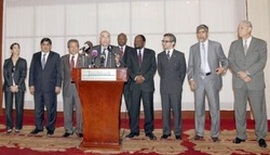
The Non-Aligned Movement (NAM) condemned the ongoing provocative, illegal actions by Israel, including settlement plans in the occupied Palestinian Territory, including East Jerusalem and the withholding of the Palestinian tax revenues, Wednesday said a statement issued by NAM. The Israeli actions have intensified following the United Nations General Assembly updating of Palestine to a non-member observer state status.
The Movement considered all these actions null and void and stressed that Israel, the occupying Power, should immediately rescind these plans and measures and cease completely all settlement activities in the Occupied Palestinian Territory, including in and around occupied East Jerusalem.
These successive deplorable actions included the announcements by Israel of plans for the expansion of existing settlements as well as the establishment of new settlements in occupied East Jerusalem and the West bank, in deliberate and grave breach of relevant principles and rules of international law and international humanitarian law, in particular the 4th Geneva Convention which governs situations of foreign occupation, and in blatant contempt of the will of the international community, said the statement.
The Non-Aligned Movement also condemned Israel’s decision to withhold Palestinian tax revenues due to the Palestinian National Authority in violation of agreements reached between the two sides and international law.
It said that Israel has declared this decision in retaliation for the adoption of General Assembly resolution 67/19. Such a deplorable act constitutes a blatant unlawful acquisition of funds and collective punishment.
It is impairing the ability of the Palestinian National Authority to deliver public services, pay public sector salaries and operate governmental institutions. It further aggravates the financial crisis imposed on the Palestinian National Authority, it added.
NAM reiterated its continuous calls to the Security Council to shoulder its responsibility and take all necessary measures to ensure that Israel immediately terminates all these illegal actions.
“The message must be sent to Israel that it is expected to fully abide by its commitments under international law, uphold the rule of law, cease all illegal measures intended to alter and prejudge the situation on the ground, cease all provocations and incitement, including by its illegally transferred settlers, against the Palestinian people and their leadership,” said the statement.
The Movement reaffirmed its unwavering commitment to a just and comprehensive solution to the Arab-Israeli conflict, with the question of Palestine at its core, and to the immediate restoration of the inalienable rights of the Palestinian people, including to exercise self-determination and sovereignty in their independent State of Palestine with East Jerusalem as its capital.
The Movement considered all these actions null and void and stressed that Israel, the occupying Power, should immediately rescind these plans and measures and cease completely all settlement activities in the Occupied Palestinian Territory, including in and around occupied East Jerusalem.
These successive deplorable actions included the announcements by Israel of plans for the expansion of existing settlements as well as the establishment of new settlements in occupied East Jerusalem and the West bank, in deliberate and grave breach of relevant principles and rules of international law and international humanitarian law, in particular the 4th Geneva Convention which governs situations of foreign occupation, and in blatant contempt of the will of the international community, said the statement.
The Non-Aligned Movement also condemned Israel’s decision to withhold Palestinian tax revenues due to the Palestinian National Authority in violation of agreements reached between the two sides and international law.
It said that Israel has declared this decision in retaliation for the adoption of General Assembly resolution 67/19. Such a deplorable act constitutes a blatant unlawful acquisition of funds and collective punishment.
It is impairing the ability of the Palestinian National Authority to deliver public services, pay public sector salaries and operate governmental institutions. It further aggravates the financial crisis imposed on the Palestinian National Authority, it added.
NAM reiterated its continuous calls to the Security Council to shoulder its responsibility and take all necessary measures to ensure that Israel immediately terminates all these illegal actions.
“The message must be sent to Israel that it is expected to fully abide by its commitments under international law, uphold the rule of law, cease all illegal measures intended to alter and prejudge the situation on the ground, cease all provocations and incitement, including by its illegally transferred settlers, against the Palestinian people and their leadership,” said the statement.
The Movement reaffirmed its unwavering commitment to a just and comprehensive solution to the Arab-Israeli conflict, with the question of Palestine at its core, and to the immediate restoration of the inalienable rights of the Palestinian people, including to exercise self-determination and sovereignty in their independent State of Palestine with East Jerusalem as its capital.
1 jan 2013
PLC endorses Gaza government budget for fiscal year 2013 with big deficit
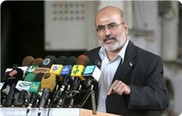
GAZA, (PIC)-- The Palestinian legislative council approved the Gaza government’s budget for fiscal year 2013 in the presence of deputy premier and finance minister Ziyad Al-Zaza to the tune of 897 million dollars.
Zaza addressed the PLC session on Monday saying that the budget plans to achieve financial stability for the government and to reduce the deficit through limiting government expenditure and increasing local revenues without adding burdens on low to medium income citizens.
MP Jamal Nassar, the chairman of the PLC budget committee, said that the budget targets improving infrastructure in order to facilitate investments.
He said that the expected revenues in 2013 would amount to 243 million dollars or 27% of the total expenditures estimated at 897 million dollars with a deficit of 654 million dollars.
He explained that the deficit would be covered by financial aid and donations.
The MP said that the Qatari projects are not included in the budget since the Qatari government directly supervises and finances their expenditures through its office in Gaza.
Zaza addressed the PLC session on Monday saying that the budget plans to achieve financial stability for the government and to reduce the deficit through limiting government expenditure and increasing local revenues without adding burdens on low to medium income citizens.
MP Jamal Nassar, the chairman of the PLC budget committee, said that the budget targets improving infrastructure in order to facilitate investments.
He said that the expected revenues in 2013 would amount to 243 million dollars or 27% of the total expenditures estimated at 897 million dollars with a deficit of 654 million dollars.
He explained that the deficit would be covered by financial aid and donations.
The MP said that the Qatari projects are not included in the budget since the Qatari government directly supervises and finances their expenditures through its office in Gaza.
Algeria Transfers $26m to Alleviate PA’s Financial Crisis

Algeria transferred $26 million to the Palestinian Authority to help it solve part of its severe financial crisis, deputy Arab League secretary-general Ahmed Ben Helli said Tuesday. He said that Algeria has informed the Arab League that it has decided to transfer the $26 million, which were due in April, to alleviate part of the PA’s severe financial crisis.
Ben Helli said Arab League Secretary-General Nabil Elaraby has sent urgent letters calling on Arab governments to speed up the implementation of the monthly $100 million safety net agreed on in the Baghdad summit to help the PA overcome its financial crisis that led to PA’s inability to pay salaries for its employees.
The $100 million equal the amount of Palestinian tax revenues that come through Israel and which Israel has decided to freeze to punish the PA for becoming a non-member state of the United Nations.
Ben Helli said Arab League Secretary-General Nabil Elaraby has sent urgent letters calling on Arab governments to speed up the implementation of the monthly $100 million safety net agreed on in the Baghdad summit to help the PA overcome its financial crisis that led to PA’s inability to pay salaries for its employees.
The $100 million equal the amount of Palestinian tax revenues that come through Israel and which Israel has decided to freeze to punish the PA for becoming a non-member state of the United Nations.
